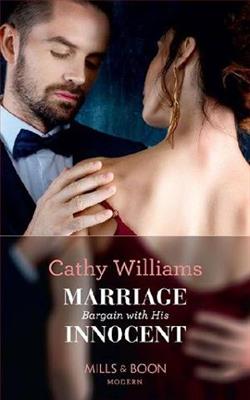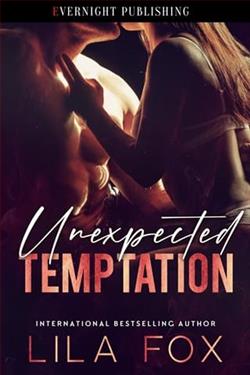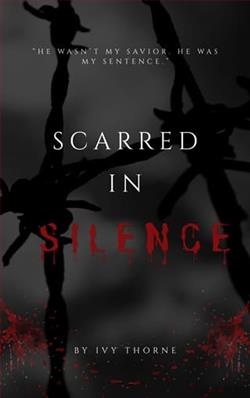Page 106 of The Paid Companion
It was a warm, sunny day. When she arrived at her destination she found Lucinda Colyer and Charlotte Atwater waiting for her in the perpetual funereal gloom of Mrs. Blancheflower’s parlor.
“There you are, Elenora.” Lucinda reached for the teapot. “We are anxious to hear your news.”
“I think you will find it very interesting.” Elenora sat down on the sofa and surveyed her two friends. “I apologize for the short notice.”
“Do not worry about that,” Charlotte said. “In your note you claimed that there was a matter of great import that we had to discuss immediately.”
“Good heavens, it happened, didn’t it?” Lucinda’s eyes lit with horrified expectation. “Just as I predicted. Your new employer took advantage of you. My poor, poor, Elenora. I did warn you.”
Elenora thought about what Arthur had done to her last night and the incredible sensations she had endured as a result. She suddenly felt quite warm.
“Calm yourself, Lucinda,” she said, and took a sip of tea. “I assure you St. Merryn has not perpetrated any grievous insult upon my person.”
“Oh.” Lucinda’s face fell in acute disappointment, but she managed a weak smile. “I’m so relieved to hear that.”
Elenora put the cup down on the saucer. “I’m afraid that I cannot regale either of you with thrilling tales of my employer’s lechery, but I think that you will find what I have to say even more exciting. It should certainly prove to be a great deal more profitable.”
Arthur stood in the center of the small room that Parker had used as a parlor. There was something very wrong about this place.
When Lady Wilmington had given him the key an hour before, she had assured him that he would find Parker’s lodgings in the same condition that they had been in the day before, when he had been taken away to the asylum. She had made it clear that she had not yet had time to remove any of her grandson’s possessions or furnishings.
Arthur had gone through each of the rooms with methodical precision. He had not found the red stones, but that was not what was making him uneasy. What bothered him was the appearance of these rooms.
On the surface, everything seemed entirely appropriate and unremarkable. The furnishings in the bedchamber, sitting room and kitchen were precisely what one would expect to see in lodgings that had been used by a fashionable young gentleman. The bookcase contained the works of the most popular poets and an assortment of the classics. The clothes in the wardrobe were in the latest style.
There was nothing unusual or out of the ordinary, Arthur noted. And that was what was wrong. Because Parker was a most unusual and extraordinary villain.
Elenora was amused by Lucinda’s and Charlotte’s reaction to what she had just said. They stared at her in appalled astonishment.
“In short,” she concluded, “the gentlemen in the clubs have all concluded that St. Merryn has played a great joke upon Society. They believe that he hired me to serve as an extremely convenient mistress.”
“They have concluded that you are his mistress posing as his fiancée. And that he has arranged to have you live right under his roof so as to have you conveniently at hand. How utterly outrageous,” Lucinda exclaimed.
Charlotte gave her a quelling frown. “Do try to remember that Elenora is not actually St. Merryn’s mistress, Lucinda. That is merely the rumor that is going around the clubs.”
“Yes, of course,” Lucinda said hastily. She gave Elenora an apologetic, if somewhat regretful grin. “Do go on.”
“As I was saying,” Elenora continued, “the wagers all involve the date that St. Merryn will end his little charade and dismiss me.” She paused a beat to make certain she had their full attention. “I see no reason why we should not take advantage of this situation, to place our own bets.”
Comprehension appeared first in their eyes. It was followed almost at once by the first glimmers of wonder and hope.
“It would be a certainty,” Charlotte whispered, awed by the possibilities. “If Elenora could persuade St. Merryn to end their association on a specific day—”
“I do not think there will be any problem there,” Elenora assured them. “I believe that St. Merryn will cooperate on the matter of the exact date.”
“And we would be the only ones who knew that date,” Lucinda breathed. “Why, we might each win a fortune.”
“It would be tempting to wager several thousand pounds,” Elenora said, “but I do not think that would be wise. A vast sum might make people suspicious. We do not want anyone questioning our bets.”
“How much, then?” Lucinda demanded.
Elenora hesitated, thinking. “I expect that we could safely wager a total of seven or eight hundred pounds. I should think any amount under a thousand would be small enough to go unnoticed in the betting books. We will split the winnings three ways.”
“Certainly sounds like a fortune to me,” Lucinda declared, entranced. She glanced meaningfully up at the ceiling. “It is a good deal more than I expect to see from Mrs. Blancheflower in her will, and I probably stand a greater chance of collecting it. I am starting to think my employer may outlive me.”
“But how would we arrange to place the bet?” Charlotte asked. “No lady can walk into one of those clubs in St. James and put a wager in the book.”
“I have considered the problem closely,” Elenora said, “and I believe that I have a plan that will work.”















